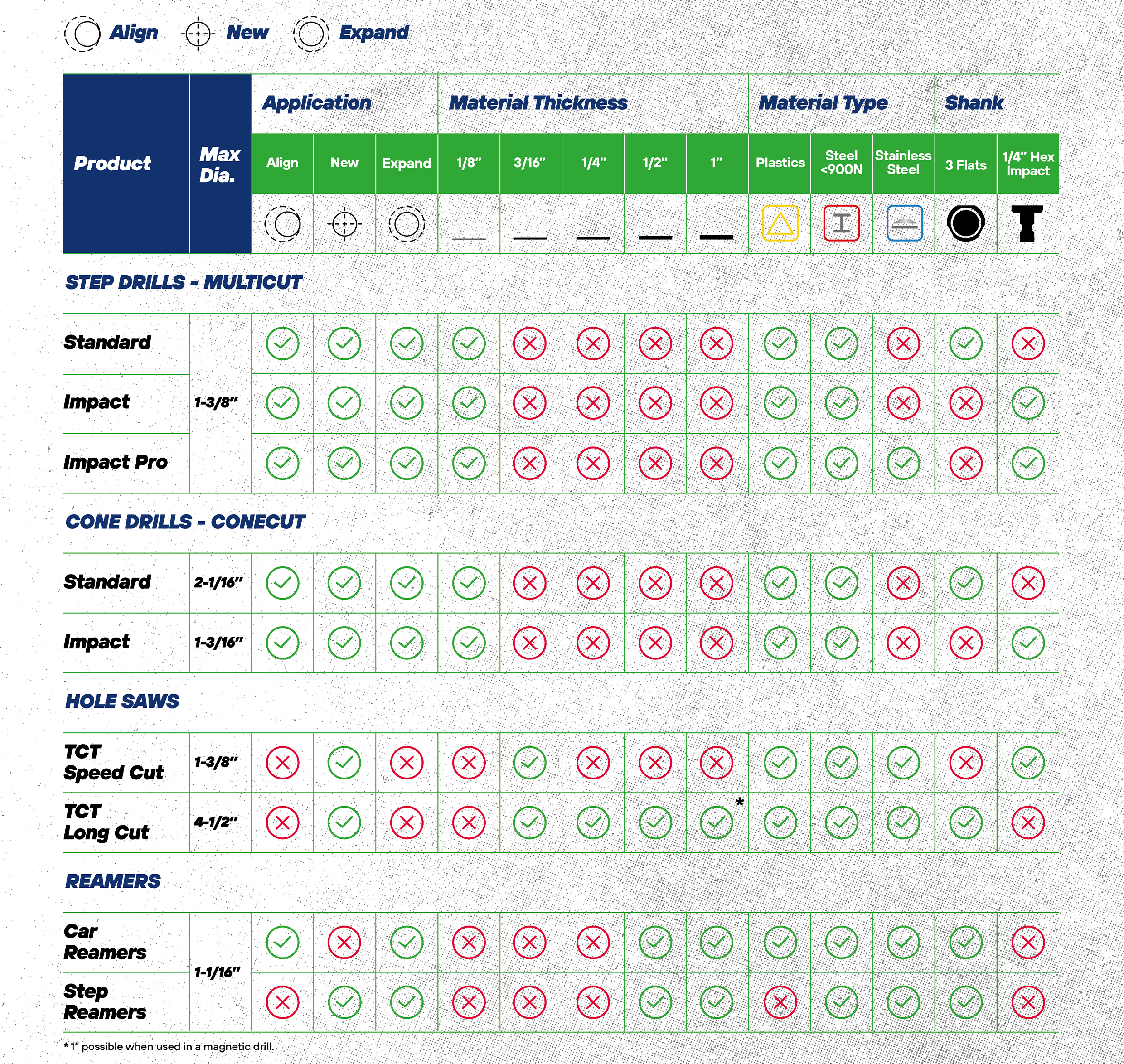
Learn All About Tools.
Want to learn more about metalworking products? Use our search engine to find out more about the range we offer.

-
What Is A Step Drill?
A step drill is a specialized drill bit that varies in diameter, it features ‘steps’ of increasing size which enlarge a hole the further the bit drills into the material. This allows their user to drill different diameter holes in a piece without switching drill bits.
These versatile drill bits are manufactured from a number of different materials, including High Speed Steel (HSS) and cobalt, with more expensive bits coming with carbide tips for increased longevity and performance.
Suitable for use with a wide range of power drills, these tools can provide unmatched flexibility, increasing efficiency without compromising on performance.
-
How Do Step Drills Work?
Step drills are cone-shaped drill bits, the smaller diameter tip drills into the material, providing a pilot hole in the stock, which can then be enlarged by the rest of the tool.
Step drill bits therefore gradually enlarge the hole, meaning that both wider and smaller diameter holes can be drilled with the same bit.
-
What Are Step Drills Used For?
These specialized drill bits are used for a number of different applications, their most common uses are:
Enlarging Holes
Similarly to a countersink, step drills can enlarge existing holes. However, with specific diameters they can drill more precisely sized holes. Therefore, resizing pre-drilled holes can be done both quickly and accurately.
Drilling A Variety Of Different Sized Holes
Projects often require a wide variety of different specifications, such as numerous depths and diameters of holes in different materials.
Therefore, step drills are ideal for this situations due to their versatility; for example, a step drill made from appropriate-strength material can make a number of different sized holes in sheet metal stock, then be used on a cast iron workpiece afterwards, without needing to switch drill bits at any stage.
This brings efficient, cost-effective performance as a single drill bit can be used in place of numerous bits.
Benefits Of Step Drills
With their range of different applications, the step drill can offer a number of different benefits to its user, such as:
- Very clean holes: Not only are step drills very accurate, they produce clean holes without minimal burr. This gives them a notable advantage over other common types of drill.
- Quick and precise: Step drill bits can drill prices holes fast, their variable diameters allow them to cut larger holes much quicker than a normal drill bit. This efficiency is priceless in many industries.
- Suited to sheet metal: These drill bits are extremely good for use on sheet metal, cutting quick holes of varying diameter.
- Several sizes in one: Their design means that they can produce a number of different hole sizes, meaning that drilling does not have to stop in order to switch another sized bit into the tool. This is not only highly convenient, it also saves time and money.
- The lower acute cut angle of a step drill makes it easily capable of drilling into softer materials, including brass and even plastics.
-
Which Trades Use Step Drills?
Electrical
Step drills can often be found in electrical industries, being used for drilling panels and cabinets for the cable gland installation. With their wide range of applications, these useful drill bits are appropriate for the daily challenges of the electrical industry,
Plumbing
Suited to drilling through pipes, step drills are often used for access holes and installation. Ready for a range of different tasks, the step drill is vital for a trade which encounters a wide range of situations on a daily basis. Rather than carrying a number of different drills throughout the day, the step drill can do the work of them all conveniently.
Metal Fabrication
The versatility of the step drill, with its ability to cut various different hole diameters and enlarge existing holes, makes it a key tool in metal fabrication.
Automotive and Aviation
Complex projects requiring a number of different sized holes, cut with extreme precision, rely on the many benefits of the step drill. In an industry where inaccuracy can have catastrophic consequences, step drills provide the necessary precision to get the job done.
-
What Materials Are Step Drills Used For?
Step drills are suited to a number of different materials, depending on the drill itself. These include both ferrous and non-ferrous metals, pipework, copper, brass and aluminum as well as plastics and stainless steel.
Capable of cutting hard metals such as cast iron and steel, as well as softer stock including thin sheet metal or plastic, step drills are capable of working with various different target workpieces and can account for a number of factors.




